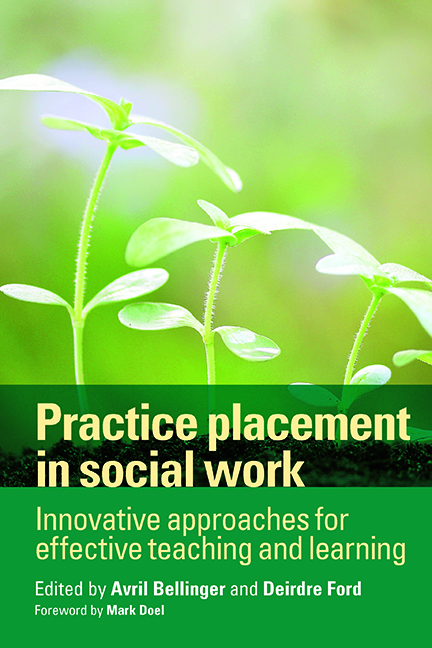Book contents
- Frontmatter
- Dedication
- Contents
- Foreword
- Notes on contributors
- Introduction
- One Student-led services
- Two International placements: learning from a distance
- Three The outside looking in – an independent social worker’s experience of practice educator work
- Four ‘Do you have to be white to pass this course?’ Developing support for black and minority ethnic students in a predominantly white area
- Five Men in social work education: building a gendered alliance
- Six Hidden in plain sight: use of an arts-based method for critical reflection
- Seven Getting our hands dirty: reconnecting social work education as if the earth matters
- Eight Social media for students in practice
- Nine Developing placement capacity in the third sector
- Ten Observations of student practice: what difference does observer qualification make?
- Eleven Filling the gap: constructive responses to the erosion of training standards for practice educators
- Twelve The concept of integrity in relation to failing and marginal students
- Thirteen Cultivating discretion: social work education in practice and the academy
- Index
Four - ‘Do you have to be white to pass this course?’ Developing support for black and minority ethnic students in a predominantly white area
Published online by Cambridge University Press: 01 September 2022
- Frontmatter
- Dedication
- Contents
- Foreword
- Notes on contributors
- Introduction
- One Student-led services
- Two International placements: learning from a distance
- Three The outside looking in – an independent social worker’s experience of practice educator work
- Four ‘Do you have to be white to pass this course?’ Developing support for black and minority ethnic students in a predominantly white area
- Five Men in social work education: building a gendered alliance
- Six Hidden in plain sight: use of an arts-based method for critical reflection
- Seven Getting our hands dirty: reconnecting social work education as if the earth matters
- Eight Social media for students in practice
- Nine Developing placement capacity in the third sector
- Ten Observations of student practice: what difference does observer qualification make?
- Eleven Filling the gap: constructive responses to the erosion of training standards for practice educators
- Twelve The concept of integrity in relation to failing and marginal students
- Thirteen Cultivating discretion: social work education in practice and the academy
- Index
Summary
Introduction
‘Do you have to be white to pass this course?’ These are the words of one black student speaking in a support group, exasperated and frustrated from the discomfort and isolation felt as a result of failing grades, impenetrable feedback, isolation and a sense that it is all you, not the system. This chapter outlines our response to that student's plea.
Sharon Soper and Geraldine Blomfield are lecturers/practice educators for social work programmes at Plymouth University. Social workers by profession, Sharon is still in practice and works predominantly with children and families where there has been abuse, loss and or trauma, while Geraldine's background is in adult mental health. Our role in higher education is to support and to facilitate the learning of adults who want to become professional social workers. It is specifically focused on supporting student learning through their practice experience. As argued in Chapter Thirteen, however, the practice learning experience of social work students should not be dislocated from academic learning within the institution. We therefore place student experience in the context of learning in higher education.
We are both interested in the issues of inequality and oppression that blight the lives of the people we have worked with. Sharon is a mixed-heritage woman brought up in a very deprived area of Manchester and raised by a mother who valued education and prided herself on making sure her children achieved at school in order to escape poverty. Geraldine was brought up with seven siblings in South Africa during the apartheid system. Geraldine belongs to a tribe called ‘The Coloureds’ (a name given by the South African regime during apartheid and still in use) and also comes from a very deprived area. Her experience of migrating to England was that if you are in a different country, you are expected to fit into the institution's rules and regulations, however oppressive they may appear, and that it is not possible to bring about change.
While it is important to challenge the idea of black and minority ethnic (BME) people as ‘victims’, this can lead to a dangerous cycle of focusing attention away from institutional practices and social oppression, and towards the individual actions and attitudes of BME students (Freire, 1970).
- Type
- Chapter
- Information
- Practice Placement in Social WorkInnovative Approaches for Effective Teaching and Learning, pp. 55 - 70Publisher: Bristol University PressPrint publication year: 2016

